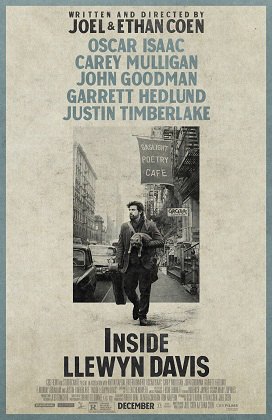Inside Llewyn Davis
- 21 Dec 2015
- I've been obsessed with this movie for the past year. Its critical acclaim and limited appeal reflect the plight of the main character. It's depressing and comforting at the same time.

The rest of the world knows them as Poe Dameron and Kylo Ren, but I know Oscar Isaac and Adam Driver as Llewyn Davis and Al Cody, respectively. I saw them last year when I watched Inside Llewyn Davis on Blu-Ray. Their first scene is a recording session for a corny song written by Justin Timberlake’s character Jim. Recorded on February 18, 1961 (according to the contract), the song is about the space program envisioned by John F Kennedy.
Llewyn is The Original Hipster, but his desperation surpasses his integrity. Instead of future royalties, he takes immediate pay of $200 for his performance. Then he bums Al for a night on the man’s couch, even though they’ve just met. The most poignant moment happens when Llewyn is later sitting on said couch. He tries to shove a box full of his and his late partner’s unsold albums under an end table, but he finds a box full of Al’s unsold albums.
The most poignant scene is in an empty music club, the Gate of Horn. Llewyn convinces the owner Bud Grossman to hear an impromptu audition, but Grossman ultimately declares, “I don’t see a lot of money here.” Llewyn then rejects an offer to audition for Grossman’s new trio and thanks the man for advising him to reunite with his partner, without mentioning the other half of Timlin & Davis has long since jumped off the George Washington Bridge.
I’ve always thought of Grossman as being callous and clueless, but I’ve watched the movie again and realized that he does show hints of sympathy for Llewyn. The camera focuses on Grossman’s face during most of Llewyn’s performance; the man obviously sees past Llewyn’s half-hearted lies to hide his desperation. This fictional version of Albert Grossman is presumably correct in his assessment: as a solo musical act, Llewyn is “not bad.”
Grossman claims that people won’t “connect” with Llewyn like they supposedly do with Troy Nelson, a man-child and US serviceman whom Llewyn has met through Jim and his wife Jean, played by Carey Mulligan. Llewyn thinks Troy is a high-functioning retarded person, but Troy has already played at the Gate of Horn and gained management interest from Grossman. To Llewyn, Troy succeeding where he fails is another downer.
So why does Llewyn struggle as a folk musician? While he plays at the The Gaslight, two separate audience members really dig his performance. He also regularly crashes at the Upper West Side apartment of a folk-loving Columbia professor and his wife. Llewyn has admirers, but there aren’t enough of them to support his career, possibly because folk is such niche genre of music.
Folk-music concerts don’t fill stadiums, and folk-music movies don’t fill theaters. On the other hand, Llewyn sees a young Bob Dylan play onstage at the end of the movie. Dylan would obviously become a superstar because of his original and topical songwriting, which to be fair, Llewyn doesn’t have. The movie is based on the life of Dave Van Ronk, an early mentor of Dylan and notable figure of the Greenwich Village folk scene in the 60s.
Like Van Ronk, Llewyn doesn’t become a household name. I wonder what happens to him after the movie ends. He’s probably too old to be drafted for the Vietnam War several years later, and I can’t imagine him enlisting; maybe he becomes a Merchant Marine again after scrounging enough money to pay for his dues and licenses that his sister has accidentally-on-purpose thrown out. All I know is, if Llewyn Davis really existed, I’d buy all his albums.